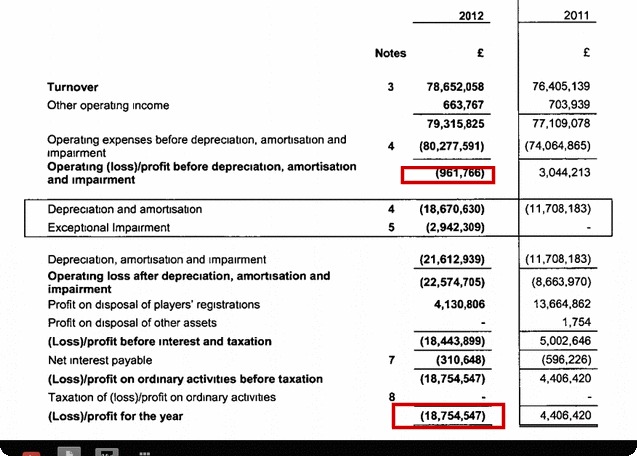Time to call clubs to account
Premier League clubs are resorting to increasingly devious actions to bury bad financial bad news. Comparatively few fans are skilled at analysing club accounts so rely on journalists to interpret their team's financial results for them. However, clubs realise that if there is bad news to presented in the accounts, they can avoid the unwelcome glare of media and fan attention by timing their release so the news is not fully reported.
Recently Aston Villa released their annual accounts (another set of shockingly bad figures) at 4.30 on a Friday afternoon. The club chose this time deliberately – it knew that many journalists had pretty-much packed up work for the day (and in any event the next-days paper lay-outs had already been produced). David Conn of the Guardian was at his desk until after 6.30pm on the Friday writing up the review of the accounts. However, for practical reasons most other the newspapers didn’t manage to report Villa’s figures. The ploy worked - newspapers reported on the weekend football action on the Sunday and by the following week it was ‘old news’ and they had escaped media scrutiny. Somewhere at Villa Towers, a Media Relations Manager is receiving a pat on the back for the way they handled the release.
Other clubs have done something similar. Man City also released their figures (another poor set of results) on a Friday afternoon. However City’s approach was, if anything, even more cynical. As with Villa, journalists were not aware in advance that the figures would be released that day (clubs rarely do). However, on the Friday morning, the club released two stories to the press (one about Dzeko was particularly thin and had some journalists scratching their heads about its relevance). The aim was to get newspapers to fill their lay-outs with City pieces so that when the accounts were released, they would be either ignored completely or else reported as a post script. When the figures were released in the afternoon, they were accompanied with a press briefing –key sections were repeated verbatim and unchallenged. This included a seemingly incorrect/ misleading piece about the wages paid to players signed to players pre-June 2010.
Ultimately City’s plan also worked – the Saturday newspapers carried little in-depth analysis of their figures. One piece of interesting information –the fact that the owners paid £12m to the club for ‘intellectual property and know-how’ slipped under the radar almost entirely.
Chelsea and Fulham’s approach was also particularly interesting. Both clubs made a detail-lacking upbeat Press Release to announce their figures, some weeks in advance of the release of the full figures. Fulham’s approach was probably the more cynical of the two. The club announced that it had made an ‘Operating Profit’ of £1.2m. However when the results were actually filed at Companies' House, it was clear that the club had not made any Operating Profit - the accounts report a £900k Operating Loss.
Frustratingly, the term ‘Operating Profit/Loss’ has no fixed definition. The accounts revealed that Fulham had used an extraordinarily generous definition of Operating Proff/Loss - one that excluded any amortisation of player transfer fees! To Fulham, it seems purchasing and utilising players is not part of their ordinary business.
Fulham's accounts - extract of P&L:

Clearly all top-flight clubs routinely purchase players from other clubs so Fulham’s definition was disingenuous at best.
The figures were actually considerably worse than the club portrayed them be. After expenses, it transpired that Fulham’s triumphant ‘Operating Profit’ was actually a loss for the season of £18.8m! However you won’t find any discussion of this figure in any newspaper – by the time the news filtered out, Fulham’s results were considered old news and went unreported.
Chelsea made a similar detail-lacking press release. Much to everyone’s surprise they declared that they had made a £1.4m profit over the 2011/12 season. This claim was reported unchallenged by most papers. To his credit Steve Tongue in the Independent on Sunday ran a piece questioning how the club had managed to achieve a seemingly impossible profit; ‘Winds of change blowing for Chelsea but do the accounts add up?’ When the accounts were filed in January we found that around £18.5m was cancellation of some preference shares. The share transaction has yet to be explained by the club and it is not clear if this can be counted as ‘relevant income’ for the purpose of FFP or if the timing has been artificially manipulated to help them pass the FFP test.
Clubs are technically free to release their figures whenever and however they like (as long as the accounts are filed at Companies House on time). Some clubs, like Liverpool, understand that they have a moral duty and relationship with their fans – Liverpool released their uncomfortably poor results on a Monday morning. Other clubs like Chelsea, City, Fulham and Villa will take a little longer to realise the world has moved and the zeitgeist is with’sustainability’ rather than insularity and evasion.
blog comments powered by Disqus
